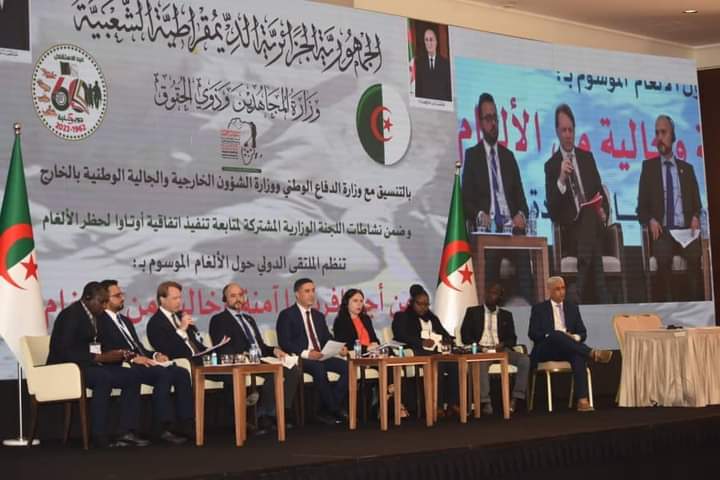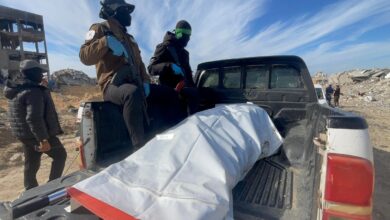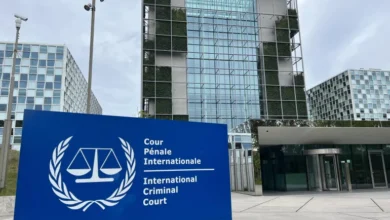France polluted the land of Algeria with 11 million mines

Algeria has re-introduced the file of compensation for the victims of mines, which were planted by the French colonialists in Algeria, which left more than 7 thousand victims, including those who suffered permanent disabilities, in one of the largest colonial crimes whose effects remained extended even after the independence of Algeria.
The head of the National Association of Mine Victims in Algeria, Mohamed Djawadi, confirmed during the international forum marked “For a Safe and Mine-Free Africa”, that his foundation will continue to work on following up on the French state with regard to compensating mine victims and recognizing its crimes in this context during the colonial era.
During the international forum on the Algerian experience in combating mines, the speaker highlighted that Algeria remains committed to all international conventions and treaties in this field, which made it a “pioneer” in this humanitarian mission with international testimony, stressing Algeria’s continuation in extending its hand and providing assistance to countries, including African ones, and its willingness to participate. experience in mine action.
The talk about not giving up the demand for compensation comes in a special political context with France, characterized by the desire to deal with the memory file with a new approach based on dialogue between the Algerian and French parties through the establishment of a committee of historians between the two countries that looks into the outstanding issues as stipulated in the Algerian Declaration that was signed. The presidents of the two countries visited him during Emmanuel Macron’s visit to Algeria in August 2022.
According to the official responsible for following up the implementation of the Anti-Personnel Mine Ban Treaty, Colonel Rashid Massoud, Algeria, which has polluted its land with more than 11 million mines, “has spared no effort in harnessing its financial resources, and has been able to cleanse the country, provide assistance to the victims in all aspects, and fulfill its obligations.”
The spokesman highlighted that this international forum, which was hosted by Algiers, constitutes an additional contribution to the country’s efforts to achieve the humanitarian goals of the Ottawa Convention, as it is a member of the Committee to Enhance Cooperation for the period 2023-2024, noting that “issues related to mine action cannot wait.”
In this context, he stated that the regional approach would provide an additional opportunity to mobilize efforts in this field and highlight the humanitarian dimensions in order to eradicate this scourge, which still poses security, humanitarian and economic challenges in many regions of the world, including the African continent, as a result of the residual waste. Wars and armed conflicts.
He stressed that Algeria has finally cleared its lands of all mines, and this was stated in the annual report of the Ottawa Convention, noting that there is international recognition of the country’s pioneering experience in mine action and the role of the People’s National Army, which alone dealt with this task and became a “pioneer and role model.”
On the political side of the issue, the Minister of Mujahideen and People with Rights, Eid Rabika, presented Algeria’s willingness to extend its hand to the international community and exert all its efforts with its pioneering experience to contribute in an “effective and coordinated” way to raising the challenge of removing anti-personnel mines planted in various parts of the world to reduce the resulting humanitarian and economic threats. about her.
During this forum, a documentary was shown highlighting the extent of the work carried out by the army to clear the land of Algeria and its eastern and western borders of anti-personnel mines and its assistance to the victims of these bombs.
It is historically proven that French colonialism, in order to clamp down on the Algerian revolution, established two lines of barbed wire starting in 1956 on the western and eastern borders to prevent the flow of weapons to the revolutionaries, and surrounded those wires with mines to make them impossible to cross.
Therefore, the largest number of victims of anti-personnel mines was recorded in the main border areas concerned, along the “Shall and Maurice lines”, that is, at the level of the states of El Tarf, Souk Ahras, Qalma, and Tebessa (the eastern borders) and the states of Tlemcen, Naama, and Bechar (the western borders).
According to a report submitted to the United Nations in 2019, Algeria counts 7,300 mine victims dating back to the period of the liberation war, including 4,830 Algerian civilians during the revolution and 2,470 after independence, causing a deficit of at least 20%. 1,625 direct victims of these mines have been recorded at the level of the seven border states, including 178 women. 44% of the injured represent shepherds, 23.6% passersby, 0.4% vehicle drivers, and 29.5% owners of multiple activities.
Even after independence, according to historians, France remained reluctant to hand over maps of the mines that claimed the largest number of victims in the seventies and eighties of the last century, while Algeria alone bore the cost of treating the victims and enabling them to grant their dignity for life.
The closing session of the forum, this evening, culminated in presenting the results and recommendations, on the horizon of reaching a safe Africa, by benefiting from the Algerian experience, as it is a pioneer in this field.
#France #polluted #land #Algeria #million #mines
#oussama_boulegheb #elhiwardz #alakhibariat.xyz #elhiwar #elhiwar-en



